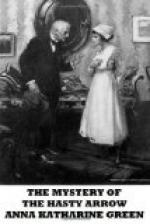“Mr. Roberts is the friend of many a good man who would swear to his integrity with a clear conscience. I would have sworn to it myself, a month ago, had I heard it questioned in the slightest manner; and I may live to swear to it again, notwithstanding the doubts which have been raised in my mind by certain strange discoveries which link him to this unhappy affair by what we are pleased to call circumstantial evidence. For, as I am obliged to acknowledge, the one great thing we rely upon, in accusations of this kind, is so far lacking in his case: I mean, the motive.
“I know of none—can, in fact, conceive of none—which would cause a gentleman of even life and ambitious projects to turn a deadly weapon upon an innocent child with whom he is not, so far as we can discover, even acquainted. Dementia only can account for such a freak, and to dementia we must ascribe this crime, if it is necessary for us to find cause before proceeding to lay our evidence before the District Attorney. All I propose to do at present is to show you my reasons for thinking that the arrow which slew Angeline Willetts—or, as we have been assured by unimpeachable authority, Angeline Duclos masquerading under the name of Angeline Willetts—was set to bow and loosed across the court by the gentleman we have just mentioned.”
Here Mr. Gryce stopped for a look of encouragement from the severely silent man he was endeavoring to impress. But he did not get it. With a full sense of his years weighing upon him as never before, he sighed, but continued with little change of tone:
“In the first day or two of keen surprise following an event of so many complicated mysteries, I drew up in my own mind a list of questions which I felt should be properly answered before I would consider it my duty to submit to you a report to the disadvantage of any one suspect. This was Question One:
“’Whose was the hand to bring up into the museum gallery the bow recognized by Correy as the one which had been lying by for an indefinite length of time in the cellar?’
“Not till yesterday did I get any really definite answer to this. Correy would not talk; nor would the Curator; and I dared not press either of them beyond a certain point, for equally with yourself, I felt it most undesirable to allow anyone to suspect the nature of my theory or whom it especially involved.
“The Curator had nothing to hide on this or any other point connected with the tragedy. But it was different with Correy. He had some very strong ideas about that visit to the cellar—only he would not acknowledge them. So yesterday, after the satisfactory settlement of another puzzling question, I made up my mind to trap him—which I did after this manner. He has, as most men have, in fact, a great love for the Curator. In discussing with him the mysterious fetching up of the bow and its subsequent concealment in the Curator’s office, I remarked, with a smile I did not mean to have him take as real, that only the Curator himself would do such a thing and then forget it; that it must have been his shadow he saw; and I begged him, in a way half jocose, half earnest, to say so and have done with it.




